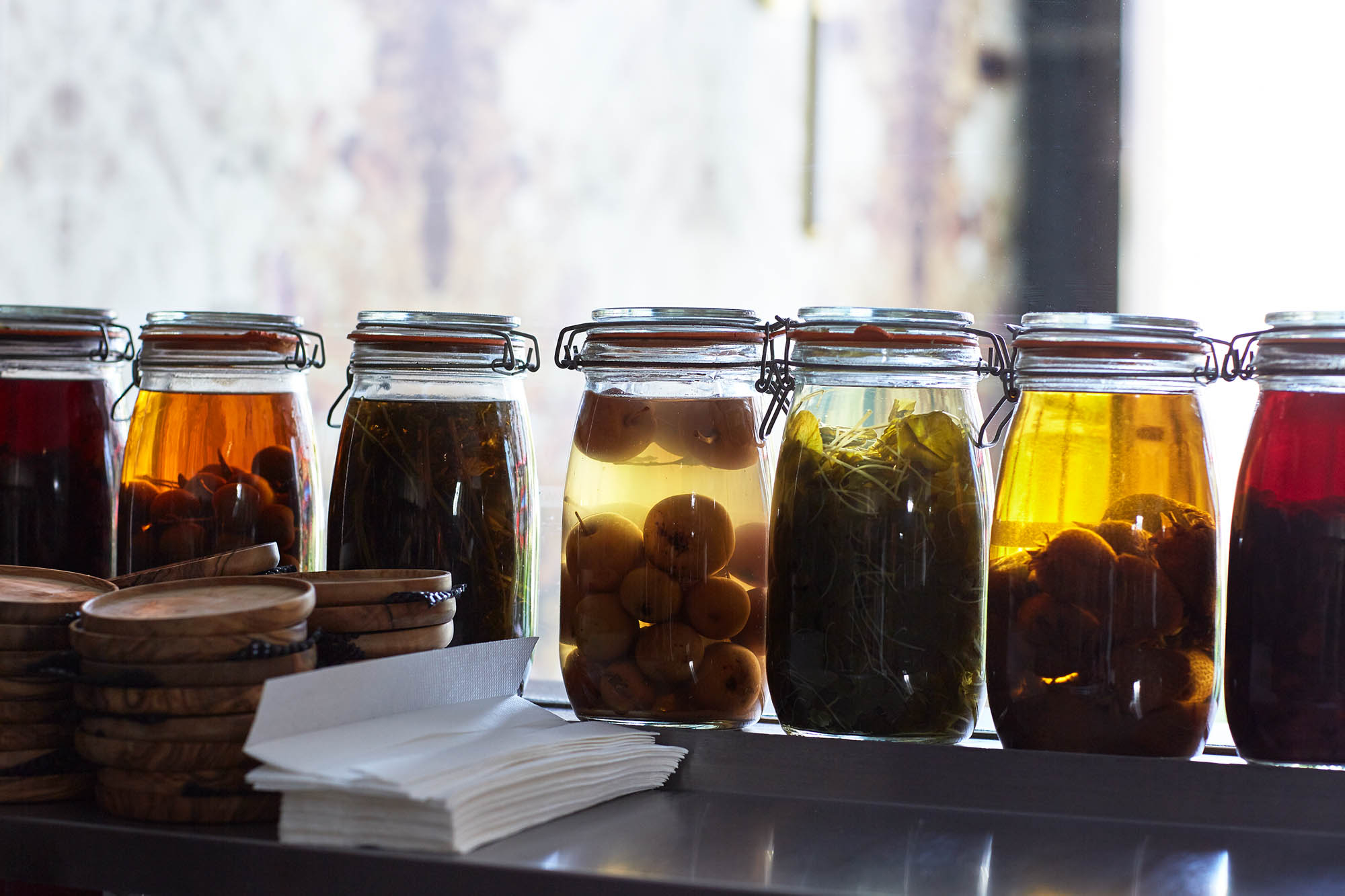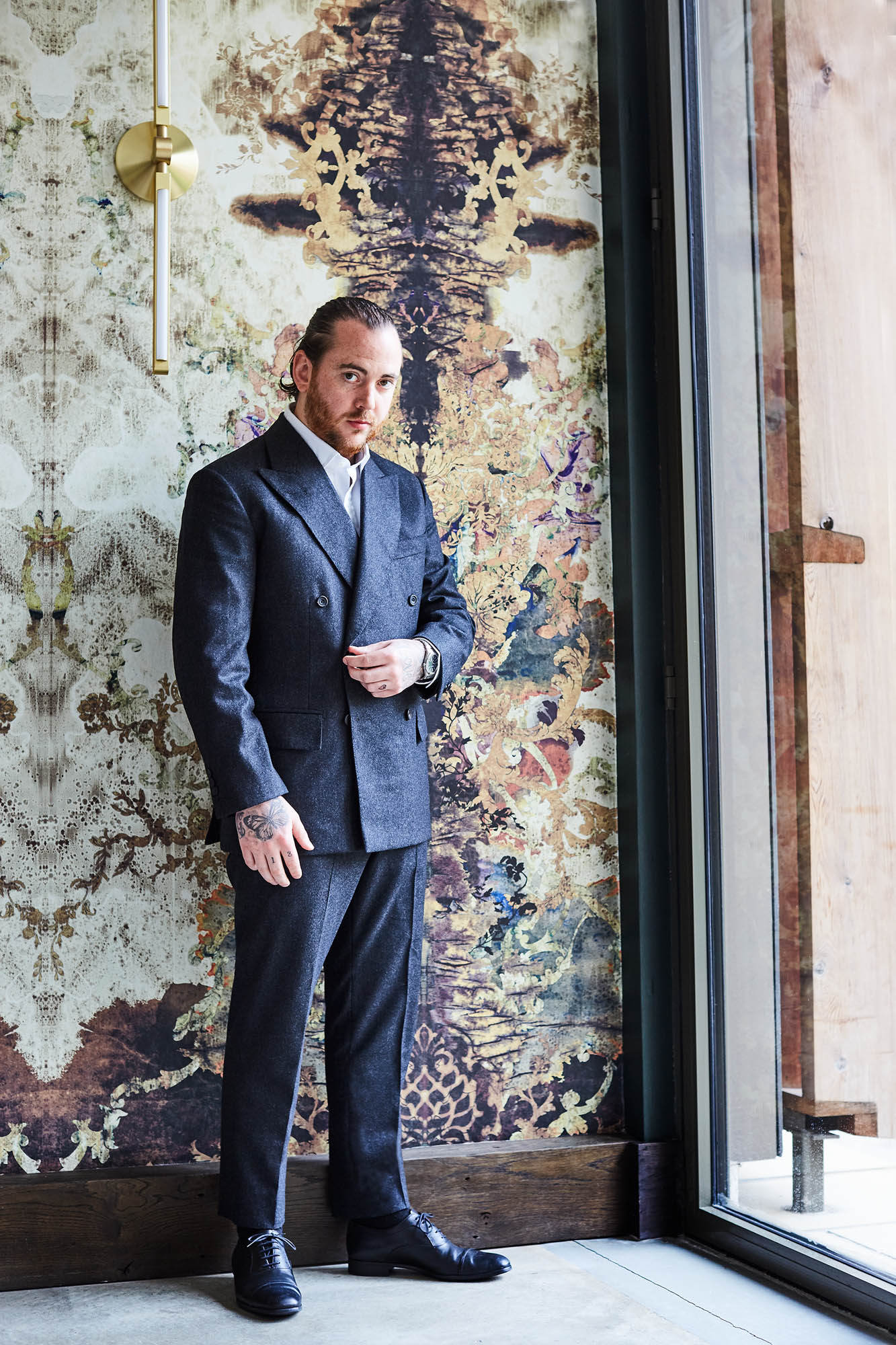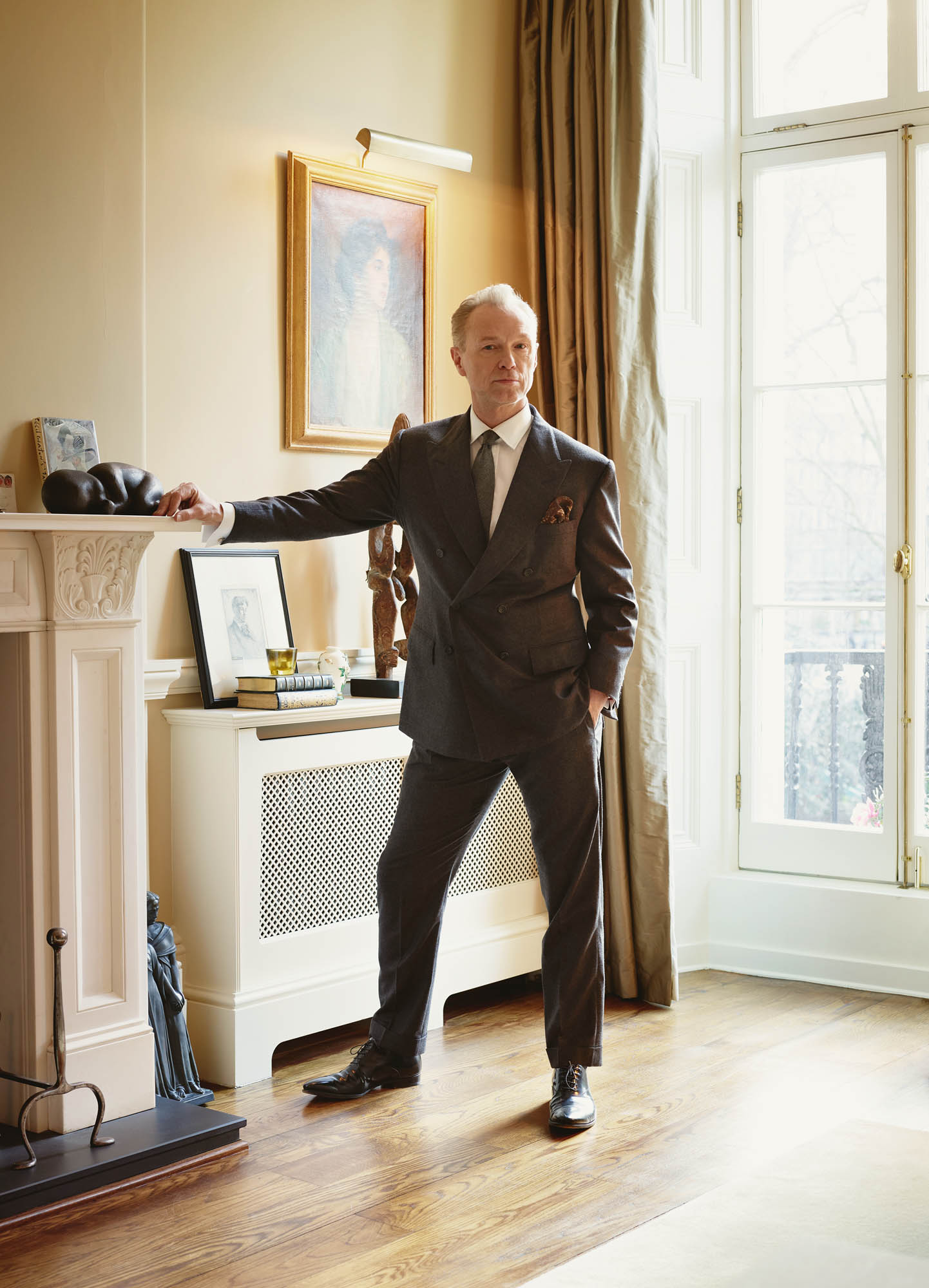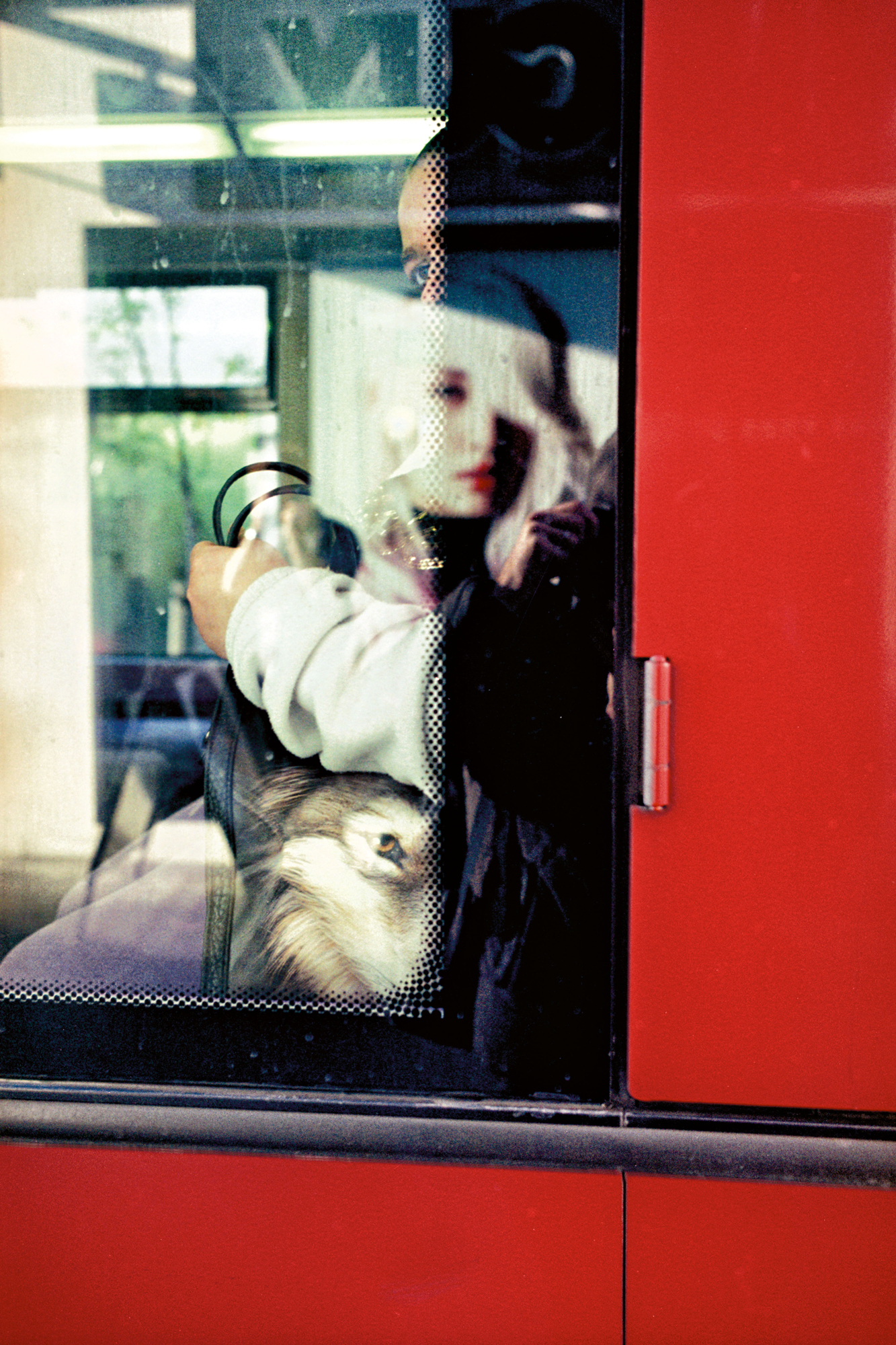Unsurprisingly, given that he spends between 16 and 18 hours a day in chef’s whites, Tom Sellers doesn’t wear a lot of tailoring – or at least not anymore. “I used to only wear a suit when I had to go to court,” laughs the tattooed, top-knotted “bad boy” of London’s food scene over a table at his Michelin-starred Story restaurant, which serves novel British cuisine a scallop’s throw from the River Thames. Was he in the dock very often then? “When I was younger, more than I liked,” says the 32-year-old ruefully.
Sellers opened Story in Bermondsey just over five years ago, when he was 26; he recently closed the restaurant temporarily for refurbishment. He calls the new look “progressive luxury”: brick and concrete contrasting with the pristine white tablecloths, polished marble and, overhead, delicate swallows by artist Michelle McKinney. The artwork in the stairwell is by the Connor brothers; the music is curated by Rudimental, a mate of his. Overall, though, the interior is more high-end and less hip than you might expect from Sellers’ exterior, or how he’s sometimes painted in the press. “We wanted something that was reflective of our craft,” he says. “To still have the edge that we’ve always had, but put a silk cloak over it.”
Heavily involved in every aspect of overhauling the space – a former Victorian toilet block, but don’t let that put you off – Sellers is someone with a strong aesthetic taste. “I know what I want,” he says. “I can be quite brutal at times, but I think people like the honesty. It makes it easier for my designers, my peers.” He’s equally particular about his apparel, even if it seems relaxed in nature. “I’ll just dress casually, because I’m in my clothes for, like, probably half an hour to and from work,” he says. “So I’ll just sling on a pair of jeans and a T-shirt. But when I get the opportunity to dress up, it’s always nice. When you put on a good suit, if you’re going for dinner or something, it’s a hard feeling to beat.”

Go for dinner at Story and you’ll be dazzled by a tasting “narrative” of 10 or 12 courses for dinner and five or eight for lunch. But instead of handing everyone an identical menu when they come in, Sellers and his team offer a bespoke service. “We cook for each table individually, so we tailor it to their needs – see how I got the ‘tailor’ in there?” he jokes. “If it’s a returning guest, we’ll make sure they see slightly different food to what they had last time, or if they really loved a certain dish, we’ll make sure they see it again.” Some of the food and drink is even prepared tableside on trolleys; as a memento, and so they know what they’ve eaten, customers are given the menu on their way out.
Sellers is into fashion, if not often in it. “I went through a massive phase of really liking Givenchy, especially when they had all the Rottweiler prints,” he says. “I like what Virgil Abloh is doing with Off-White. I’m excited that Kim Jones has gone to Dior Homme because he’s going to do some amazing things. When Kim did the Louis Vuitton x Supreme thing, I thought that was hot: progressive but luxury at the same time. That’s what I like.”
Presentation is a critical component of fine dining, and not just on the plates: the uniforms of the staff at Story are inspected constantly. But Sellers insists that he’s no sergeant major. “I’m not regimented from a military standpoint, in terms of haircut or being clean-shaven,” he says. (Clearly not, given his own style and stubble.) “I think people need to be able to be themselves. But I think you always need to be presented well: a tailored suit if you’re on the floor, shined shoes, clean fingernails … I’m quite a stickler for the basic stuff.” Basic, but welcome when handling food.
Nor does Sellers impose a strict dress code on his clientele, instead relying on the venue to set the tone. “We’ve had the odd mishap where someone tries to roll in in shorts and flip-flops,” he says. “But generally now people know what this restaurant’s about, so they dress appropriately.” Some old-school places insist on gentlemen wearing jackets while eating, and provide them for those who don’t. “I don’t think that’s comfortable,” says Sellers. Not least because the jacket probably won’t fit very well.
Besides, a jacket is no guarantee that you’ll look soigné – particularly if it doesn’t fit, and is thrown over the kind of outfit worn by someone who was going to a nice restaurant and didn’t bother to check whether there was a dress code. Conversely, the absence of a jacket doesn’t necessarily equal slovenliness. It’s more a question of attitude. “I’ll go to dinner sometimes and I’ll just wear a black T-shirt, but with tailored trousers and smart shoes,” says Sellers. Or a pair of patent-toe Lanvin trainers, of which he owns every colour going: “It’s not what you wear, it’s how you wear it.”

Sellers’ attitude has gotten him noticed. As a teenager, he washed pots in a Nottingham pub kitchen where the head chef remarked on his work ethic (inherited from his welder father) and taught him some skills. Having struggled at school, where he was told he wouldn’t achieve anything and got into fights, Sellers immediately warmed to the kitchen’s heat, discipline and “violence”. “When you’re striving for great things in such an instant environment, it can be a very intense place,” he explains. “If something goes wrong, you can’t send an email on Monday, or hit out-of-office. You have to deal with it right there and then. That adrenaline, that pressure, ‘It’s now or never’ … I liked it. And I still like it.”
Lest you mistake him for another macho chef who browbeats his terrified staff with a stream of F-words, Sellers decries that kind of abuse in no uncertain terms. “I was a victim of bullying when I was at school,” he says. “There’s no place for it. Also, there has been a shadow cast over our industry because that behaviour happens, and I wanted to stand there and say it doesn’t have to. I don’t behave like that in my restaurant, ever.”
That’s not to say Sellers doesn’t show passion. “Sir Alex Ferguson said, ‘There’s nothing wrong with losing your temper,’ and I agree,” says the Manchester United fan. “Sometimes as a leader, when you feel like the focus isn’t quite there, you need to find a small thing to make a big deal of. And I’ve done that many times – like the napkin isn’t right, and I’ll get really upset.” But the hairdryer treatment has to be used sparingly. “If you come to work every day and shout, after a while the effect wears off,” he continues. “Ultimately you want to create an environment where everyone respects each other, works for each other and shares a common goal. And I think we very much have that.”
“I’ll go to dinner sometimes and I’ll just wear a black T-shirt, but with tailored trousers and smart shoes. It’s not what you wear, it’s how you wear it”


A highly precocious chef-patron who is also executive chef the Lickfold Inn in West Sussex, Sellers has gleaned his management style piecemeal from the star names he’s worked under: Tom Aikens at his eponymous restaurant in London, Thomas Keller at Per Se in New York and René Redzepi at Noma in Copenhagen. As Sellers’ website says, with characteristic swagger, he has cooked in “some of the world’s best kitchens – including his own”. “You learn what’s good and what’s bad,” he says. “And then you learn on the job, of course. Every day is a school day.” He’s consciously worked at leadership, studying books on it – including Sir Alex’s.
It’s an occupational hazard in many careers that the further up the ladder you progress, the less hands-on you become. “I started off very much as a player-manager, and now I’ve become more of a manager and less of a player,” says Sellers, who was actually a handy footballer growing up and represented his country at ice hockey. “At the end of the day, I still love to cook, so it starts and ends with food for me, in a creative sense.” (He wrote a sort of cookbook called A Kind of Love Story, containing accounts of dishes rather than recipes.) But with 50-odd staff at Story, it’s inevitable that he has to look at the bigger picture. And the perspective he gets being away from the oven brings valuable insights.
“Again, I hate to use the Fergie analogy, but he said that the best thing he ever did was stop running the training sessions and start watching them, because he would see so much more that way,” says Sellers. “It’s similar for me: I get the opportunity to take two steps back and watch my whole team work. You can find the flaws and tweak things quicker; you see things differently.” Though he’s doing less of the work in the sense of cooking the food, management is by no means an easy job: “Cooking is one thing, but getting a group of 50 people to understand your culture, philosophy and values – and represent that every day – is very different.” Out of the frying pan, as they say.
Sellers sums up his food credo up in a nutshell as “good ingredients that you show respect to and cook well”. Ultimately, it boils down to flavour. “If it tastes good, that’s the most important thing,” he says. “And then as you progress as a chef, if you can do both the flavour and the visual, then that’s when you’ll start to really reap the reward.”
Even without bullying, cooking can be infamously brutal, with high pressure and long, anti-social hours; Sellers’ staff do four-day shifts to try and prevent the burnout that’s so prevalent in the industry. A supporter of Hospitality Action, which aids workers who are in crisis, plus Unicef and the Bobby Moore Fund, he’s also getting involved with the Prince’s Trust as an ambassador, with a view to setting up a foundation and granting scholarships to young people who’ve been failed by the education system as he was.
So what makes it worth the blood, sweat and tears: the industry accolades, the happy customers or the personal satisfaction? “You’re always seeking some element of self-gratitude,” he says. “There’s not an artist out there that will tell you, ‘I just do it for other people.’” Yet he distinguishes art from his craft. “Art’s only art if it serves no purpose, in my opinion,” he says. “You can’t really say that about food because it does serve a purpose: you’ve got to eat it. So there is a difference. It’s about finding that balance.”
Part of that equilibrium is satisfying his customers. “We are in hospitality so it’s really important that you listen to your guests,” he says. “They’re sitting and eating the meal in your restaurant, you’re not.” Social media has made them easier to listen to; it’s also made them harder to please: these days, everybody’s a critic, or on TripAdvisor. Sellers believes that the ability to pass online comment, and the competition for readers, encourages the expression of ever more extreme opinions, more often than not hostile: “To get to the top of that pile, you have to be more outrageous.” And a hot take is so much more delicious when it’s mercilessly skewering someone or something.
Less combative these days, Sellers did however notoriously retaliate to Evening Standard food critic Fay Maschler’s scathing review of Ours in Kensington, where he was consultant chef. (He’s since ended the association.) In a forthright open letter, he stated his respect for the longstanding journalist while questioning her accuracy and pointedly citing Anton Ego, the critic in Ratatouille. “I felt like her writing wasn’t factual,” he explains. Generally though, he doesn’t engage with criticism: “I used to follow it a lot more than I do now, because it hurts when people say things that aren’t very nice about you, or something that you’ve worked really hard for – not just myself, but a group of people that I’m responsible for.”
“Cooking is one thing, but getting a group of 50 people to understand your culture, philosophy and values is very different”

Like his dining room, Sellers retains a degree of edge: his fiercely competitive streak goes all the way back to playing sport when he was younger. But he’s also refined with age. (A butterfly tattoo on his hand signifies metamorphosis, and that perhaps he’s not a hard nut.) “You learn over time that it’s OK for people not to like things,” he says. “It’s a very subjective matter, food. It doesn’t mean that it’s a bad dish, it just means that it wasn’t for them – sometimes. And then sometimes you have to realise when you’ve not quite got it right as well.” He endeavours to take criticism, positive or otherwise, as a sign that he’s doing something right: “It’s just part of my day-to-day life. It’s like brushing your teeth.”
Sellers doesn’t go home and rustle up a 12-course tasting menu as part of his day-to-day life – not after an 18-hour shift, anyway. He might chuck a chicken in the oven at the weekend to eat with some roasted vegetables if it’s cold out, or a salad if it’s hot. But in the evenings he’ll content himself with “something easy that I don’t have to think about”, like beans on toast à la minute or a bowl of cereal. (Honey Loops are a favourite.) “You read about chefs who say, ‘Yeah, I cook every weekend’, and I’m like, ‘Really? Do you? Really?’” he says. “Because when I’ve spent all week cooking, the last thing I want to do is that. I’d much rather go out and let someone do it for me.”
Being so dialled into food though, does a meal out risk becoming a busman’s dinner, so to speak? “If I go to another very established restaurant, of course there’s an element of me that’s a chef still: I’m looking, analysing and thinking about what they’ve done or how they’ve done it,” says Sellers. ”Which leads me to say that I don’t eat like that that often, because I don’t want to feel like I’m working.” For that reason, he’ll choose a cuisine that he doesn’t have a deep knowledge of, such as Asian, or a more low-key restaurant: nearby French bistro Casse-Croûte or sushi chain Roka. He eats so often at the latter that it’s become a running joke among his staff: “I like it, it’s really consistent, it’s tasty.”
Either way, Sellers occupies his mind with something other than cooking when he’s on the other side of the pass, whether for work or pleasure. “If it’s a business dinner, it’s business, so the food is a secondary element,” he says. “And if I take my girlfriend out, or my parents, it’s about the people. I don’t get that much free time, so I’m engaged with them. The food is obviously great, but I’m not really that focused on it.”




